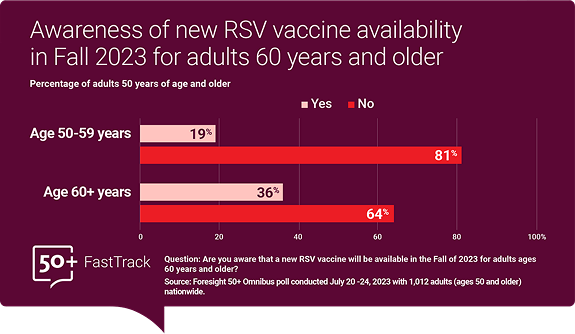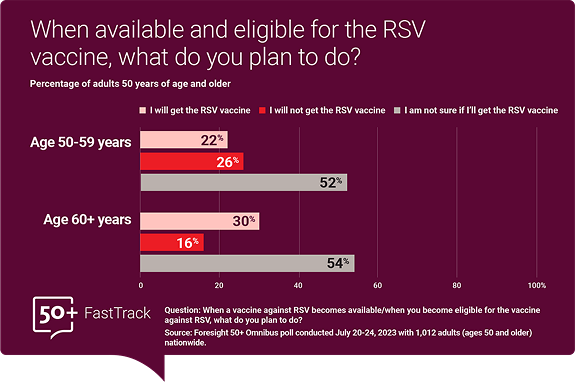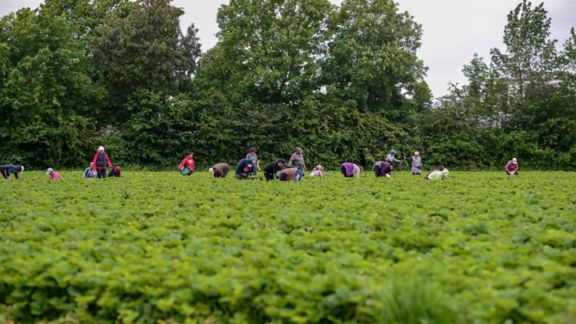Most Older Adults Unaware of New RSV Vaccine & Unsure About Getting It
For Media Inquiries:
More communication needed for older adults to make informed choices about new vaccine
Chicago, September 5, 2023 — Despite increased attention on potential risks from respiratory syncytial virus, or RSV, the vast majority of U.S. adults ages 50 and older are unaware of a new vaccine rolling out this fall, a new survey shows. The latest Foresight 50+ poll from NORC at the University of Chicago shows most adults are unaware of the virus.
RSV is a common and contagious virus that typically produces mild symptoms but can put older or chronically ill patients at serious risk. The poll findings come on the heels of a rise in RSV cases in 2022, raising concerns within the public health community that lack of awareness could undermine the first-ever RSV vaccine’s life-saving potential.
Seven in 10 adults over 50 said they had not heard about the RSV vaccine. Sixty percent reported hearing or reading little to nothing about RSV itself. According to the survey, these low levels of awareness were consistent across gender, race/ethnicity, education, and income.
Overall Awareness of RSV Vaccine Availability by Age Group

When surveyed, 73% of older adults reported they definitely would not (20%) or were not sure if they would (53%) get the new RSV vaccine. The top reasons cited for their hesitancy were: concerns about the side effects (43%), concerns about vaccine development and the approval process (38%), and a lack of concern about getting seriously ill from RSV (30%).
Likelihood of RSV Vaccine Uptake by Age Group

The findings are particularly significant because RSV poses a significant health risk to older adults. An estimated 60,000 to 160,000 older adults are hospitalized with RSV each year, and 6,000 to 10,000 die annually from RSV infection, according to the Centers for Disease Control
and Prevention.
“Such low awareness of a major health risk, especially for those who suffer from chronic illnesses, raises substantial concerns about people’s health as we head into the fall and winter seasons,” said Neha Trivedi, research scientist at NORC and lead analyst of the data. “As the United States braces itself for another potential ‘tripledemic’ of RSV, flu, and COVID-19, people need to be more aware of these health threats, available vaccines, and other precautions such as washing your hands, staying home when you are sick, and covering your cough.”
The data indicate opportunities for improvement. Most respondents (53%) reported being unsure about getting the vaccine, as opposed to firmly against it (20%).
There is a unique opportunity for outreach and messaging to older adults about RSV and the new vaccine,” said Amelia Burke-Garcia, director of Digital Strategy and Outreach for NORC’s Public Health department. “Providers, pharmacists, and public health professionals should increasingly communicate about the risks of RSV and the availability of the new vaccine.”
Methodology
The self-funded poll was conducted between July 20 and 24, 2023, during the Foresight 50+ monthly omnibus survey. Foresight 50+ is NORC and AARP’s probability-based panel designed to be representative of the U.S. household population of adults age 50 and older. The sample included 1,012 interviews with a nationally representative sample (margin of error +/- 4.3 percentage points) of adults ages 50 and older, of which 964 respondents completed the survey via the web and 48 completed the survey via telephone. A comprehensive listing of all study questions, tabulations of top-level results for each question, and detailed methodology is available on norc.org.
About NORC at the University of Chicago
NORC at the University of Chicago conducts research and analysis that decision-makers trust. As a nonpartisan research organization and a pioneer in measuring and understanding the world, we have studied almost every aspect of the human experience and every major news event for more than eight decades. Today, we partner with government, corporate, and nonprofit clients around the world to provide the objectivity and expertise necessary to inform the critical decisions facing society.
Contact: For more information, please contact Eric Young at NORC at young-eric@norc.org or (703) 217-6814 (cell).
About Foresight 50+ FastTrack
Foresight 50+ FastTrack is a series of rapid-turnaround surveys that explore the attitudes and behaviors of the highly influential 50+ demographic. These scientifically rigorous insights are drawn from NORC and AARP’s monthly Foresight 50+ Omnibus survey.
For more information about NORC’s Foresight 50+ panel, contact Foresight50-BD@norc.org.





